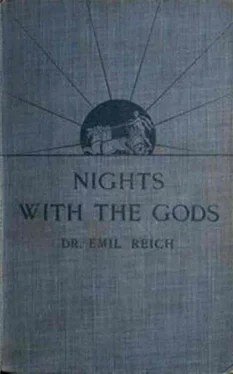Emil Reich - Nights with the Gods
Здесь есть возможность читать онлайн «Emil Reich - Nights with the Gods» — ознакомительный отрывок электронной книги совершенно бесплатно, а после прочтения отрывка купить полную версию. В некоторых случаях можно слушать аудио, скачать через торрент в формате fb2 и присутствует краткое содержание. Жанр: unrecognised, на английском языке. Описание произведения, (предисловие) а так же отзывы посетителей доступны на портале библиотеки ЛибКат.
- Название:Nights with the Gods
- Автор:
- Жанр:
- Год:неизвестен
- ISBN:нет данных
- Рейтинг книги:5 / 5. Голосов: 1
-
Избранное:Добавить в избранное
- Отзывы:
-
Ваша оценка:
- 100
- 1
- 2
- 3
- 4
- 5
Nights with the Gods: краткое содержание, описание и аннотация
Предлагаем к чтению аннотацию, описание, краткое содержание или предисловие (зависит от того, что написал сам автор книги «Nights with the Gods»). Если вы не нашли необходимую информацию о книге — напишите в комментариях, мы постараемся отыскать её.
* Aristotle on Specialism in England
* Diogenes and Plato on Tolstoy, Ibsen, Shaw, etc.
* Alcibiades on Women in England
* Caesar on The House of Commons
* Apollo and Dionysus in England
* Socrates, Diogenes, and Plato on Religion
Nights with the Gods — читать онлайн ознакомительный отрывок
Ниже представлен текст книги, разбитый по страницам. Система сохранения места последней прочитанной страницы, позволяет с удобством читать онлайн бесплатно книгу «Nights with the Gods», без необходимости каждый раз заново искать на чём Вы остановились. Поставьте закладку, и сможете в любой момент перейти на страницу, на которой закончили чтение.
Интервал:
Закладка:
"'These humans tell stories about us owls, and about you, Mr Woodpecker, and Mr Badger, that would cause a sloth to dance with joy. They imagine they know how we see, how we fly, how we get our food, and how we make our abodes. As a matter of fact they have hopelessly wrong notions about all these things. They want, as my venerated father used to say, to tap the lightning off into nice little flasks, in order to study it conveniently. This they call Evolution.
"'The idea was mostly developed in England, in a country where they are proud of thinking that they always "muddle through somehow." These three words they apply to Nature, and call it Evolution. Once upon a time, they say—it does not matter whether 200,000 or 300,000 years, or perchance 645,789 years ago—there was my ancestor who, by mere accident, had an eye that enabled him to see more clearly at night than other birds did. This eye enabled him to catch more prey, thus to live longer, and to transmit his nocturne of an eye to his progeny. And so by degrees we muddled into owlship.
"'Is that not charming? My father used to laugh at that idea until all the cuckoos came to inquire what illness had befallen him. He told me, that an owl's eye was in strict correlation with definite and strongly individual formations of the ears, of the neck, of the feet, and of the intestines, and that accordingly a mere accidental change in the supposed ancestor's eye was totally insufficient to account for the corresponding and correlative formations just mentioned.
"'Such correlative and simultaneous changes in various organs can be the consequences only of a violent and, as it were, fulgurous shock to the whole system of a bird. Such shocks are not a matter of slow growth. As all individual animal life at present is called into existence by one shock of fulgurant forces, even so it arose originally.
"'But the English think that Nature is by birth an Englishman who adopts new organisms as Englishmen adopt new systems of measures, calendars, inventions, or laws,—i.e. hundreds of years after someone else has fulgurated them out.
"'They imagine Nature to be, by rank and profession, a middle-class man and muddler; by religion, a Nonconformist; and by politics, a Liberal. However, we know better. Nature is, by rank and profession, a free lance and a genius; by religion, a Roman Catholic; and by politics, a Tory of the Tories. Now this being so, you may imagine, Mr Woodpecker and Mr Badger, what capital fun it is to read these learned lucubrations about birds and other animals as written by humans.
"'The other day I called on Master Fox in the neighbourhood. He was ill and, in order to amuse him, I told him what they say of him in human books. He fairly burst with laughter. He told me later on, that by narrating all the Don Quixote stories told of him by man, to a big brown bear, he became the court-favourite of that dreaded king of the place.
"'I have sent the swiftest bat, to whom I gave a safe conduct, to all the birds and animals of this country, to meet at a given time on one of the peaks of the Hartz Mountains, where I mean to entertain them with the stories told by specialists on each of them, on their structure, functions, and mode of life. It will be the greatest fun we have had these two thousand years. I charged the nightingales, the larks, and the mocking birds of America to open the meeting with the most wonderful chorus that they have ever sung, and I am sure that I will deserve well of the whole community of birds and other animals by offering them this the most exhilarating amusement imaginable.'
"So spake the owl. And now, O Zeus, can you really brook Aristotle's attempt to demolish and to remove men who furnish pleasure and intense amusement to so many animals holy to men and even to the gods? I cannot believe it. You know how necessary it is to provide carefully for the amusement of people. To neglect Dionysus is to court hideous punishment. If the specialists in Nature should disappear, you will, O Zeus, have endless anarchy on all sides. Birds, insects, snakes, and reptiles, lions, felines, and bears—they will all rise in bored discontent, in the waters, on land, in the air. You will never have a free moment for calm repose.
"They will worry all the gods incessantly. They will make the most annoying conspiracies and plots and intrigues against all of us. Let us not take Aristotle seriously. He means well, and is no doubt quite right, as far as reason goes. But does reason go very far? Can he now deny the eternal rights of unreason? To remove the specialists in biology and natural history is to remove the comedy from Athens. The Athenians, in order to be ruled, must be entertained. But for me and the like of me, the Athenians could never have held out as long as they did hold out. It is even so with animals. They want their Aristophanes. They must have their specialists. Pray, Artemis, you who in your hunts over dales and mountains have heard and observed everything that concerns animals, join me in protesting against the onslaught of Aristotle on men so necessary for the well-being of animated Nature."
Artemis Diana laughed melodiously and nodded consent. The other gods, amidst great hilarity, passed a vote against Aristotle, and the sage smilingly bowed acceptance of the censure.
"I will abide," he exclaimed, "by your decision. But, pray, let me make just one more remark which, I have no doubt, the master-minds of the unique city, over which we are hovering at present, will gladly approve. I call upon you Lionardo, Michelangelo, Machiavelli, and you magnificent Lorenzo, whether I am exceeding the limits of truth. I do maintain that while the little ones have, in religion, gone from Polytheism to Monotheism, they pretend that in matters of knowledge time is constantly increasing the number of gods to be worshipped.
"At present they affect to believe no longer in the numerous gods and goddesses of the Olympus, but only in one God. In point of knowledge, on the other hand, they declare that each little department thereof is endless, requiring the study and devotion of a whole lifetime, and controlled, each of them, by a god whom they call an authority. Now, nothing can be more evident than the fact that knowledge, real knowledge, becomes increasingly more stenographic in expression, and sensibly easier of acquisition. The Chinese write encyclopædias in 6000 volumes; the modern Europeans do so in twenty-four or thirty-six volumes."
Here Diogenes interrupted the Stagirite and said: "I am afraid, O Aristotle, that your argument has little real force to boast of. It does not prove at all that the Chinese have only crude, empirical, and unorganised knowledge, while the little ones in Europe have a reasoned and systematised, and hence a less cumbrous one. This is owing to quite a different cause.
"The little ones have of late invented a method of publishing encyclopædias in a manner so well adapted to tempt, threaten, bully, or wire each member of the general public into the purchase of an entire copy, that if their encyclopædias consisted of 6000 or 10,000 volumes each, the people of England, for instance, would have to conquer Norway, Sweden, and Iceland first. Norway they would be obliged to conquer, in order to possess themselves of sufficient wood for the cases; Sweden, in order to appoint all Swedish gymnasts for the acrobatic feat of fetching a volume from the fiftieth row of a bookcase; and Iceland, in order to place excited readers of the encyclopædia in a cool place. But for this circumstance, I am sure the little ones in Europe would fain publish an encyclopædia in 15,000 volumes."
When the laughter of the Assembly had subsided, Aristotle continued: "Nothing has struck me more forcibly in my visit to their seats of learning than this universal belief in the infinitude of each tiny department or speciality. They do most gravely assert that 'nowadays' it is impossible to embrace more than one speciality; and they look upon me or Leibniz with a certain knowing smile as if in our times all knowledge would have consisted of a few jugs full of water, whereas now it is no less than an ocean. But when you ask them the simplest questions, they are at a loss how to answer them.
Читать дальшеИнтервал:
Закладка:
Похожие книги на «Nights with the Gods»
Представляем Вашему вниманию похожие книги на «Nights with the Gods» списком для выбора. Мы отобрали схожую по названию и смыслу литературу в надежде предоставить читателям больше вариантов отыскать новые, интересные, ещё непрочитанные произведения.
Обсуждение, отзывы о книге «Nights with the Gods» и просто собственные мнения читателей. Оставьте ваши комментарии, напишите, что Вы думаете о произведении, его смысле или главных героях. Укажите что конкретно понравилось, а что нет, и почему Вы так считаете.












